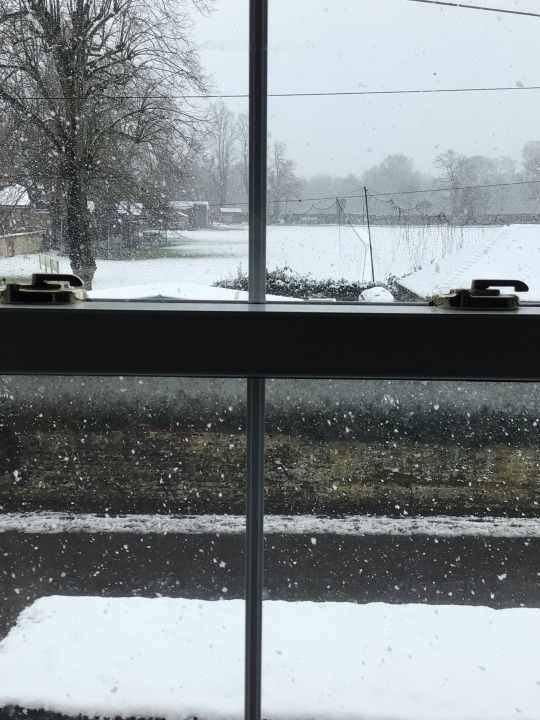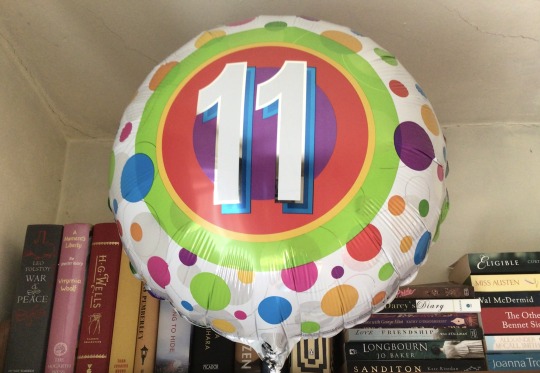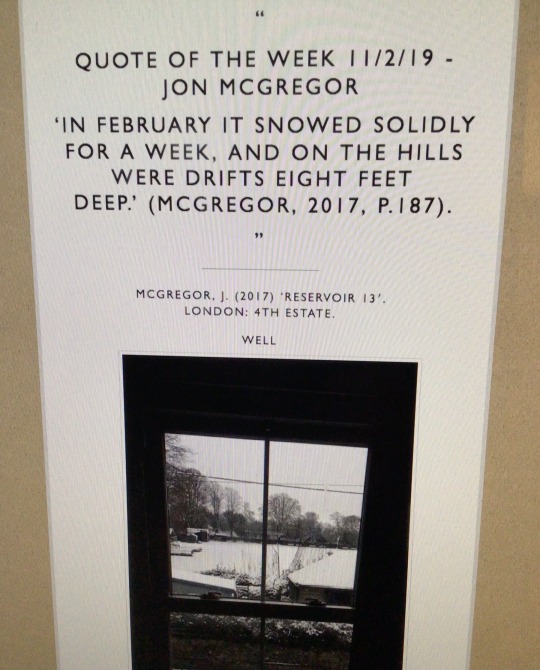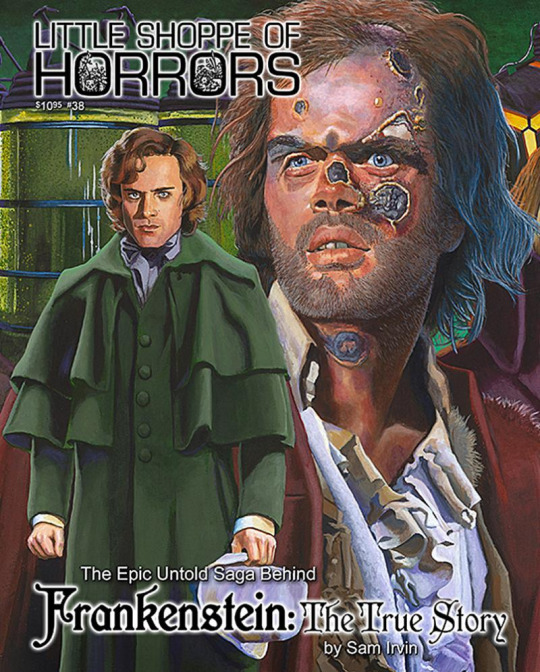#jon isherwood
Text




Jon Isherwood, "Lovers, Dancers, Partners," 1996-97,
Fox hill granite,
95½ h × 56 w × 47 d in (243 × 142 × 119 cm)
Collection of Dina and Jerry Wind
#art#love#lovers#sculpture#dancer#partner#jon isherwood#granite#abstract#abstract art#dina wind#jerry wind
2 notes
·
View notes
Text
✨top 9 books✨
tagged by @tripleaxeldiaz & @woodchoc-magnum 😊
(like felicity, i, too, will be considering a series as a single book even though the "series" in this case is very loosely defined)
001. pride and prejudice by jane austen
002. the boy series by meg cabot
003. the sound and the fury by william faulkner
004. the martian by andy weir
005. the long walk by stephen king
006. daisy jones and the six by taylor jenkins reid
007. into thin air by jon krakauer
008. a single man by christopher isherwood
009. the host by stephanie meyer
honorable mentions from childhood include a solitary blue by cynthia voigt (and several other tillerman cycle books), the anne of green gable series by l.m. montgomery, the time quintet series by madeleine l'engle, and his dark materials by philip pullman.
tagging @crazyassmurdererwall, @machtaholic, @tattooedsiren, @valleydean, @catdadeddie, @telvayns, @daincrediblegg, @tawaifeddiediaz, @buttercupbuck, and anyone else who wants to do this
#YES stephenie meyer made this list#the host is just! so fucking good sorry not sorry#i have read and re-read that book sooo many times#and it still makes me cry to this day#also sorry while i love the terror show i never even finished the book so it could not make this list
12 notes
·
View notes
Text




This is something I started doing on Twitter. Let's see if you folks dig it. Each weekday I post 4 comics that came out 30 years ago this week. For those who were buying comics at the time, it's a fun little nostalgia kick. And for those who weren't, it might reveal some buried treasure for you to discover. So here's today's installment:
Released 30 years ago this week, Doomsday was rampaging through Metropolis and the original Thor was back!
Superman: The Man of Steel #19 by Louise Simonson & Jon Bogdanove
Robin 3000 #1 by Byron Preiss & P. Craig Russell
Thor #457 by Tom DeFalco & Ron Frenz with a backup story by DeFalco & Geof Isherwood, cover by Frenz
Amazing Spider-Man #372 by David Michelinie & Mark Bagley with a backup story by Al Milgrom & Aaron Lopresti, cover by Bagley
3 notes
·
View notes
Text
readings
• Dörren, Magda Szabó
• Paradais, Fernanda Melchor
• Nattens skola, Karl-Ove Knausgård
• Trilogin, Jon Fosse
• Svar till D, Wera von Essen
• Längtans flöde, Alva Dahl
• Postmodernismen, Frida Beckman
• Min Kamp 1-6, Karl-Ove Knausgård
• Slaget om Troja, Theodor Kallifatides
• Sympatisören, Viet Thanh Nguyen
• Och solen har sin gång, Ernest Hemingway
• Moral, Lyra Ekström Lindbäck
• Jävla Karlar, Andrev Walden
• Trilogin, Andreas Lundberg
• Om uträkning av omfång 1, Solvej Balle
• En dag i öknen, Anna Axfors
• Om den fria viljan, Erasmus av Rotterdam
• Weimartyskland, Eric D Weitz
• Allegro Pastell, Leif Randt
• De tysta satelliterna, Clemens Meyer
• Fragment, Herakleitos
• Min far & Kvinnan, Annie Ernaux
• Mystik och andlighet: Kritiska perspektiv, Simon Sorgenfrei
• Farväl till Berlin, Christopher Isherwood
• Oostende 1936, Volker Weidermann
• Glaskupan, Sylvia Plath
• Fåglarna, Tarjei Vesaas
0 notes
Photo

QUOTE OF THE WEEK 13/3/23 - NANCY CAMPBELL
‘ … there was plenty to read on a winter afternoon … ‘ (Campbell, 2021, p.16).
REFERENCE
Campbell, N. (2021 [2020] ) ‘Fifty words for snow’. London: Elliott and Thompson.
*****

AND IN MARCH APPROACHING THE SPRING EQUINOX

*****

TO MY FRIEND FOR GIVING ME THIS BOOK CHRISTMAS 2021
AND THANKS AGAIN
https://quoteoftheweekblog.tumblr.com/post/707797292899516416/quote-of-the-week-30123-christine-feret-fleury
https://quoteoftheweekblog.tumblr.com/post/694395124195721216/quote-of-the-week-5922-pg-wodehouse
https://quoteoftheweekblog.tumblr.com/image/669115011859398656
https://quoteoftheweekblog.tumblr.com/post/655145816500092928/quote-of-the-week-29621-sarah-winman-two
https://quoteoftheweekblog.tumblr.com/post/130981389484/quote-of-the-week-121015-heather-redding
https://quoteoftheweekblog.tumblr.com/post/127542613844/quote-of-the-week-25815-edna-obrien-the
https://quoteoftheweekblog.tumblr.com/post/84910404854/quote-of-the-week-5-5-14-f-scott-fitzgerald
http://quoteoftheweekblog.tumblr.com/post/22112015444/quote-of-the-week-30412-edward-st-aubyn-i
XXXX
PLUS
DON’T FORGET MOTHER’S DAY

FOR MY CHILDREN IN

SUBTROPICAL HOVE ACTUALLY
AND THE COLD FAR EAST OF

CAMBRIDGE
XXXX
MOTHER’S DAY
https://quoteoftheweekblog.tumblr.com/post/679884155142684672/quote-of-the-week-28322-georges-simenon-and
https://quoteoftheweekblog.tumblr.com/post/679251677006659584/quote-of-the-week-21322-christopher-isherwood
https://quoteoftheweekblog.tumblr.com/post/645733814923034624/quote-of-the-week-15321-harriet-evans
https://quoteoftheweekblog.tumblr.com/post/613206932006862848/quote-of-the-week-16320-gail-honeyman
https://quoteoftheweekblog.tumblr.com/post/183695496439/quote-of-the-week-25319-abi-andrews-only
http://quoteoftheweekblog.tumblr.com/post/171800202349/quote-of-the-week-12318-jane-austen
http://quoteoftheweekblog.tumblr.com/post/171619342589/quote-of-the-week-5318-amanda-foreman-one
http://quoteoftheweekblog.tumblr.com/post/158887709729/quote-of-the-week-27317-katie-blackburn-and
http://quoteoftheweekblog.tumblr.com/post/158672767564/quote-of-the-week-20317-bruno-vincent-for
http://quoteoftheweekblog.tumblr.com/post/80579458904/quote-of-the-week-24314-nadeem-aslam-how
*****
QUOTE OF THE WEEK 2011 - 2023
11 EPIC YEARS

https://quoteoftheweekblog.tumblr.com/references
FROM THE ARCHIVE

http://quoteoftheweekblog.tumblr.com/post/182717275599/quote-of-the-week-11219-jon-mcgregor-in
*****
0 notes
Photo






A single man (2009)
11 notes
·
View notes
Photo

Am letzten Tag seines Lebens, obwohl sich hinreißende junge Männer für ihn interessieren, ganz zu schweigen von seiner etwas anstrengenden, aber immer noch umwerfend schönen alten Freundin, trauert der alleinstehende Mann trotzdem um seinen verunglückten langjährigen Lebenspartner. Dafür, wie häufig wir uns mit Werken von Christopher Isherwood befassen, ist es eigentlich verwunderlich, daß wir das so lange nicht angeschaut haben sollen. Es ist traurig, aber schön, und Colin Firth ist wunderbar. Außerdem ist es einer der ganz wenigen Filme, in denen der Hauptdarsteller Anzüge aus der Kollektion des Regisseurs trägt.
#A Single Man#Colin Firth#Nicholas Hoult#Julianne Moore#Matthew Goode#Jon Kortajarena#Film gesehen#Tom Ford#Christopher Isherwood
5 notes
·
View notes
Photo

A Single Man (2009)
#a single man#tom ford#2009#christopher isherwood#colin firth#jon kortajarena#sometimes awful things have their own kind of beauty#film#cinema
59 notes
·
View notes
Photo










A Single Man (2009) Director - Tom Ford, Cinematography - Eduard Grau "A few times in my life I've had moments of absolute clarity, when for a few brief seconds the silence drowns out the noise and I can feel rather than think, and things seem so sharp. And the world seems so fresh as though it had all just come into existence. I can never make these moments last. I cling to them, but like everything, they fade. I have lived my life on these moments. They pull me back to the present, and I realize that everything is exactly the way it was meant to be."
#scenesandscreens#a single man#tom ford#Colin firth#Julianne Moore#Christopher Isherwood#Matthew Goode#Nicholas Hoult#Jon Kortajarena#Paulette Lamori#Ryan Simpkins#Ginnifer Goodwin#Teddy Sears
317 notes
·
View notes
Photo

A Single Man (2009) dir. Tom Ford
#a single man#tom ford#cinematography#eduard grau#american cinema#jon kortajarena#film stills#movies#christopher isherwood#aesthetic
360 notes
·
View notes
Text
A Single Man (2009)
Drama, Romance |
A Single Man is a American drama film based on the 1964 novel of the same name by Christopher Isherwood. The directorial debut of fashion designer Tom Ford, the film stars Colin Firth, who was nominated for an Academy Award for Best Actor for his portrayal of George Falconer, a depressed, homosexual British university professor living in Southern California in 1962.
The film premiered on September 11, 2009 at the 66th Venice International Film Festival, and went on the film festival circuit. After it screened at the 34th Toronto International Film Festival, The Weinstein Company picked it up for distribution in the United States and Germany.
On November 30, 1962, a month after the Cuban Missile Crisis, George Falconer is a middle-aged English college professor living in Los Angeles. George dreams that he encounters the body of his longtime partner, Jim, at the scene of the car accident that took Jim’s life eight months earlier. He bends down to kiss his dead lover. After awakening, George delivers a voiceover discussing the pain and depression he has endured since Jim’s death and his intention to commit suicide that evening.
George receives a phone call from his dearest friend, Charley, who projects lightheartedness despite her also being miserable. George goes about his day putting his affairs in order and focusing on the beauty of isolated events, believing he is seeing things for the last time. At times, he recalls his sixteen-year-long relationship with Jim.
Director: Tom Ford
Writers: Christopher Isherwood (novel), Tom Ford, David Scearce
Stars: Colin Firth, Julianne Moore, Nicholas Hoult, Matthew Goode, Jon Kortajarena, Paulette Lamori, Ryan Simpkins
youtube
►Cast:
Colin Firth…GeorgeJulianne Moore…CharleyNicholas Hoult…KennyMatthew Goode…JimJon Kortajarena…CarlosPaulette Lamori…AlvaRyan Simpkins…Jennifer StrunkGinnifer Goodwin…Mrs. StrunkTeddy Sears…Mr. StrunkPaul Butler…Christopher StrunkAaron Sanders…Tom StrunkAline Weber…LoisKeri Lynn Pratt…Blonde SecretaryJenna Gavigan…Other Secretary #1Alicia Carr…Other Secretary #2Lee Pace…GrantAdam Shapiro…MyronMarlene Martinez…MariaRidge Canipe…Young BoyElisabeth Harnois…Young WomanErin Daniels…Bank TellerNicole Steinwedell…DorisTricia Munford…CashierDon Bachardy…Brad Benedict…Tennis PlayerRichard Buckley…Man in Waiting RoomJanelle Gill…Rifle GirlBrent Gorski…WalterJon Hamm…Hank Ackerley (voice)Janet Leigh…Marion Crane (archive footage)Patrizia Milano…Faculty MemberArnold Montey…TeacherMimi Page…Party GirlElizabeth Reynolds…History TeacherFrank Ruhl…Tennis PlayerMelissa Goodwin Shepherd…StudentBria Sherinian…College StudentGary Sievers…TeacherSarah Smick…Bookstore Cashier
Sources: imdb & wikipedia
The post A Single Man (2009) first appeared on TellUsEpisode.net.
from WordPress https://www.tellusepisode.net/a-single-man-2009.html
0 notes
Photo

Bowie was a voracious reader. In 2013, he posted a list of his top 100 favorite reads on his Facebook page.
Interviews With Francis Bacon by David Sylvester
Billy Liar by Keith Waterhouse
Room At The Top by John Braine
On Having No Head by Douglass Harding
Kafka Was The Rage by Anatole Broyard
A Clockwork Orange by Anthony Burgess
City Of Night by John Rechy
The Brief Wondrous Life Of Oscar Wao by Junot Diaz
Madame Bovary by Gustave Flaubert
Iliad by Homer
As I Lay Dying by William Faulkner
Tadanori Yokoo by Tadanori Yokoo
Berlin Alexanderplatz by Alfred Döblin
Inside The Whale And Other Essays by George Orwell
Mr. Norris Changes Trains by Christopher Isherwood
Halls Dictionary Of Subjects And Symbols In Art by James A. Hall
David Bomberg by Richard Cork
Blast by Wyndham Lewis
Passing by Nella Larson
Beyond The Brillo Box by Arthur C. Danto
The Origin Of Consciousness In The Breakdown Of The Bicameral Mind by Julian Jaynes
In Bluebeard’s Castle by George Steiner
Hawksmoor by Peter Ackroyd
The Divided Self by R. D. Laing
The Stranger by Albert Camus
Infants Of The Spring by Wallace Thurman
The Quest For Christa T by Christa Wolf
The Songlines by Bruce Chatwin
Nights At The Circus by Angela Carter
The Master And Margarita by Mikhail Bulgakov
The Prime Of Miss Jean Brodie by Muriel Spark
Lolita by Vladimir Nabokov
Herzog by Saul Bellow
Puckoon by Spike Milligan
Black Boy by Richard Wright
The Great Gatsby by F. Scott Fitzgerald
The Sailor Who Fell From Grace With The Sea by Yukio Mishima
Darkness At Noon by Arthur Koestler
The Waste Land by T.S. Elliot
McTeague by Frank Norris
Money by Martin Amis
The Outsider by Colin Wilson
Strange People by Frank Edwards
English Journey by J.B. Priestley
A Confederacy Of Dunces by John Kennedy Toole
The Day Of The Locust by Nathanael West
1984 by George Orwell
The Life And Times Of Little Richard by Charles White
Awopbopaloobop Alopbamboom: The Golden Age of Rock by Nik Cohn
Mystery Train by Greil Marcus
Beano (comic, ’50s)
Raw (comic, ’80s)
White Noise by Don DeLillo
Sweet Soul Music: Rhythm And Blues And The Southern Dream Of Freedom by Peter Guralnick
Silence: Lectures And Writing by John Cage
Writers At Work: The Paris Review Interviews edited by Malcolm Cowley
The Sound Of The City: The Rise Of Rock And Roll by Charlie Gillete
Octobriana And The Russian Underground by Peter Sadecky
The Street by Ann Petry
Wonder Boys by Michael Chabon
Last Exit To Brooklyn By Hubert Selby, Jr.
A People’s History Of The United States by Howard Zinn
The Age Of American Unreason by Susan Jacoby
Metropolitan Life by Fran Lebowitz
The Coast Of Utopia by Tom Stoppard
The Bridge by Hart Crane
All The Emperor’s Horses by David Kidd
Fingersmith by Sarah Waters
Earthly Powers by Anthony Burgess
The 42nd Parallel by John Dos Passos
Tales Of Beatnik Glory by Ed Saunders
The Bird Artist by Howard Norman
Nowhere To Run The Story Of Soul Music by Gerri Hirshey
Before The Deluge by Otto Friedrich
Sexual Personae: Art And Decadence From Nefertiti To Emily Dickinson by Camille Paglia
The American Way Of Death by Jessica Mitford
In Cold Blood by Truman Capote
Lady Chatterly’s Lover by D.H. Lawrence
Teenage by Jon Savage
Vile Bodies by Evelyn Waugh
The Hidden Persuaders by Vance Packard
The Fire Next Time by James Baldwin
Viz (comic, early ’80s)
Private Eye (satirical magazine, ’60s – ’80s)
Selected Poems by Frank O’Hara
The Trial Of Henry Kissinger by Christopher Hitchens
Flaubert’s Parrot by Julian Barnes
Maldoror by Comte de Lautréamont
On The Road by Jack Kerouac
Mr. Wilson’s Cabinet of Wonder by Lawrence Weschler
Zanoni by Edward Bulwer-Lytton
Transcendental Magic, Its Doctrine and Ritual by Eliphas Lévi
The Gnostic Gospels by Elaine Pagels
The Leopard by Giusseppe Di Lampedusa
Inferno by Dante Alighieri
A Grave For A Dolphin by Alberto Denti di Pirajno
The Insult by Rupert Thomson
In Between The Sheets by Ian McEwan
A People’s Tragedy by Orlando Figes
Journey Into The Whirlwind by Eugenia Ginzburg
222 notes
·
View notes
Photo

David Bowie’s 100 Favourite Books:
Interviews With Francis Bacon by David Sylvester
Billy Liar by Keith Waterhouse
Room At The Top by John Braine
On Having No Head by Douglass Harding
Kafka Was The Rage by Anatole Broyard
A Clockwork Orange by Anthony Burgess
Of Night by John Rechy
The Brief Wondrous Life Of Oscar Wao by Junot Diaz
Madame Bovary by Gustave Flaubert
Iliad by Homer
As I Lay Dying by William Faulkner
Tadanori Yokoo by Tadanori Yokoo
Berlin Alexanderplatz by Alfred Döblin
Inside The Whale And Other Essays by George Orwell
Norris Changes Trains by Christopher Isherwood
Halls Dictionary Of Subjects And Symbols In Art by James A. Hall
David Bomberg by Richard Cork
Blast by Wyndham Lewis
Passing by Nella Larson
Beyond The Brillo Box by Arthur C. Danto
The Origin Of Consciousness In The Breakdown Of The Bicameral Mind by Julian Jaynes
In Bluebeard’s Castle by George Steiner
Hawksmoor by Peter Ackroyd
The Divided Self by R. D. Laing
The Stranger by Albert Camus
Infants Of The Spring by Wallace Thurman
The Quest For Christa T by Christa Wolf
The Songlines by Bruce Chatwin
Nights At The Circus by Angela Carter
The Master And Margarita by Mikhail Bulgakov
The Prime Of Miss Jean Brodie by Muriel Spark
Lolita by Vladimir Nabokov
Herzog by Saul Bellow
Puckoon by Spike Milligan
Black Boy by Richard Wright
The Great Gatsby by F. Scott Fitzgerald
The Sailor Who Fell From Grace With The Sea by Yukio Mishima
Darkness At Noon by Arthur Koestler
The Waste Land by T.S. Elliot
McTeague by Frank Norris
Money by Martin Amis
The Outsider by Colin Wilson
Strange People by Frank Edwards
English Journey by J.B. Priestley
A Confederacy Of Dunces by John Kennedy Toole
The Day Of The Locust by Nathanael West
1984 by George Orwell
The Life And Times Of Little Richard by Charles White
Awopbopaloobop Alopbamboom: The Golden Age of Rock by Nik Cohn
Mystery Train by Greil Marcus
Beano (comic, )
Raw (comic, ’80s)
White Noise by Don DeLillo
Sweet Soul Music: Rhythm And Blues And The Southern Dream Of Freedom by Peter Guralnick
Silence: Lectures And Writing by John Cage
Writers At Work: The Paris Review Interviews edited by Malcolm Cowley
The Sound Of The City: The Rise Of Rock And Roll by Charlie Gillette
Octobriana And The Russian Underground by Peter Sadecky
The Street by Ann Petry
Wonder Boys by Michael Chabon
Last Exit To Brooklyn by Hubert Selby, Jr.
A People’s History Of The United States by Howard Zinn
The Age Of American Unreason by Susan Jacoby
Metropolitan Life by Fran Lebowitz
The Coast Of Utopia by Tom Stoppard
The Bridge by Hart Crane
All The Emperor’s Horses by David Kidd
Fingersmith by Sarah Waters
Earthly Powers by Anthony Burgess
The 42nd Parallel by John Dos Passos
Tales Of Beatnik Glory by Ed Saunders
The Bird Artist by Howard Norman
Nowhere To Run The Story Of Soul Music by Gerri Hirshey
Before The Deluge by Otto Friedrich
Sexual Personae: Art And Decadence From Nefertiti To Emily Dickinson by Camille Paglia
The American Way Of Death by Jessica Mitford
In Cold Blood by Truman Capote
Lady Lover by D.H. Lawrence
Teenage by Jon Savage
Vile Bodies by Evelyn Waugh
The Hidden Persuaders by Vance Packard
The Fire Next Time by James Baldwin
Viz (comic, ’80s)
Private Eye (satirical magazine, – ’80s)
Selected Poems by Frank O’Hara
The Trial Of Henry Kissinger by Christopher Hitchens
Flaubert’s Parrot by Julian Barnes
Maldoror by Comte de Lautréamont
On The Road by Jack Kerouac
Wilson’s Cabinet of Wonder by Lawrence Weschler
Zanoni by Edward Bulwer-Lytton
Transcendental Magic, Its Doctrine and Ritual by Eliphas Lévi
The Gnostic Gospels by Elaine Pagels
The Leopard by Giuseppe Di Lampedusa
Inferno by Dante Alighieri
A Grave For A Dolphin by Alberto Denti di Pirajno
The Insult by Rupert Thomson
In Between The Sheets by Ian McEwan
A People’s Tragedy by Orlando Figes
Journey Into The Whirlwind by Eugenia Ginzburg
354 notes
·
View notes
Note
Hey gina! I'm the anon who asked for book recs and yes i would love it if you could tell me who your favorite authors are.
Thank you for responding ❤
Hi darling. Okay… this is likely going to seem super random but I prefer to think of it as eclectic. 😆 Also, this is off the top of my head because my books are all packed in my garage at the moment and the knowledge that I’m leaving so many out is painful 🙃
Christopher Isherwood (too many to list, but Berlin Stories is my fave)
Daphne DuMaurier (Rebecca - my beloved)
John Irving (A Prayer for Owen Meany, in particular)
Simone de Beauvoir (The Mandarins especially)
Truman Capote (in Cold Blood… amazing)
Mikhail Bulgakov (The Master and Margarita - wow)
Mark Twain (ugh, his Joan of Arc is to die for)
Ian McEwan (The Innocents and Atonement are my faves)
David Mitchell (Cloud Atlas)
John Kennedy Toole (A Confederacy of Dunces)
Beryl Markham (West With The Night)
Joan Didion (The Year of Magical Thinking)
Brené Brown (everything she writes/says/shares, but especially The Gifts of Imperfections and Daring Greatly)
The most recent books I’ve read (I sense a theme)
Madeline Miller (The Song of Achilles)
CS Pacat (The Captive Prince trilogy)
Bethan Roberts (My Policeman)
Books I loved as a kid, but would still read today:
Enid Blyton (The Far Away Tree collection)
JRR Tolkien (The Hobbit, Lord of The Rings trilogy)
CS Lewis (The Narnia Chronicles)
Frances Hodgeson Burnett (The Secret Garden)
Edward Eager (Half Magic)
Some parenting books I love
Dan Siegel (everything, but especially Parenting From The Inside Out and The Whole-Brain Child)
Ross Greene (The Explosive Child - changed my life)
Myla and Jon Kabat-Zinn (Everyday Blessings: The Inner Work of Mindful Parenting)
Alfie Kohn (Unconditional Parenting)
Dr Joan Friedman (Emotionally Healthy Twins was a godsend)
#between 2007 and at least 2017#all I read were parenting books#and books my children would like#so my list is very lacking in contemporary fiction#but here you go#my favorite books#and authors#personal
30 notes
·
View notes
Text

Little Shoppe of Horrors #38 - The Epic Untold Saga Behind Frankenstein: The True Story by Sam Irvin | Vintage1981 Rewind
Extra Special Issue Devoted to the Making of "Frankenstein: The True Story” (Universal/NBC-TV, 1973).
First published on the eve of 2018, the 45th Anniversary of the movie and the 200th Anniversary of the novel by Mary Shelley
Expanded to 120 pages!
16 pages in full color!
First-ever 3-panel triptych wraparound/foldout cover by Mark Maddox!
2-panel diptych foldout inside cover by Bruce Timm!
Inside back cover by Paul Watts!
2 full-page, full-color interior illustrations by Neil D. Vokes!
Full-color interior illustrations by Adrian Salmon!
Article headers by Denis Meikle including one full-pager in full-color!
Over 400 photographs, most never-before-published!

Featuring:
BEAUTIFUL CREATURE: The Epic Untold Saga Behind Frankenstein: The True Story - by Sam Irvin (over 50,000 words!)
Foreword by Anne Rice (Interview with a Vampire)
Essay by Mark Gatiss (Sherlock)
Never-before-published essay by Christopher Isherwood & Don Bachardy (co-screenwriters of FTTS)
Exclusive interviews with over 20 cast and crew members, including standalone sidebar interviews with:
Leonard Whiting (Dr. Frankenstein)
Jane Seymour (Agatha / Prima)
David McCallum (Dr. Clerval)
Nicola Pagett (Elizabeth Frankenstein)
Don Bachardy (co-writer)
Ian Lewis (associate producer)
John Stoneman (first assistant director)
Plus exclusive comments from many associates of the production, including:
Sid Sheinberg (former president of Universal)
Angela Lansbury
Richard Chamberlain
Jon Voight
Geoffrey Holder
Jack Larson (Jimmy Olsen in The Adventures of Superman)
Essay by Alec Smight, son of the late director Jack Smight
Essay by James Duke Mason, grandson of the late James Mason (Dr. Polidori)
Tributes to the late Michael Sarrazin (The Creature) by his brother Pierre Sarrazin and others
Essay on screenwriters Christopher Isherwood & Don Bachardy, by Katherine Bucknell
Essay on composer Gil Mellé, by James Anthony Phillips
Profile of producer Hunt Stromberg Jr., by Sam Irvin
Sidebars on missing scenes, missing passages from the published script, various cuts, the model kit, etc.

This issue is jam-packed with surprises beyond your wildest imagination! The staggering, never-before-reported journey to bring Frankenstein: The True Story to the screen reads like a Who’s Who, directly involving such luminaries as Marlon Brando, Alfred Hitchcock, Steven Spielberg, Richard Burton, Elizabeth Taylor, Francis Ford Coppola, John Boorman, John Schlesinger, Jon Voight, Roman Polanski, Warren Beatty, Elsa Lanchester, Franco Zeffirelli, and more!
Whether you are a fan or not, the adventure behind the creation of Frankenstain: The True Story is so astounding, it is an epic unto itself. Prepare to catch your jaw before it drops to the floor.
Special promo for LITTLE SHOPPE OF HORRORS #38 - Buy this issue and one or more of any of our previous 37 issues, and get a free copy of "Little Shoppe of Horrors #28", the in-depth coverage of Hammer Film's classic Gothic Ghost story - THE WOMAN IN BLACK. Check this website for a full list of issues and contents.
http://www.littleshoppeofhorrors.com/
#Little Shoppe of Horrors#Frankenstein: The True Story#Sam Irvin#Mark Maddox#Leonard Whiting#Jane Seymour#David McCallum#Nicola Pagett#James Mason#Michael Sarrazin#Anne Rice#Mark Gatiss#The Woman in Black#Hammer Films#Universal Television#NBC#Scream Factory#Tom Baker
6 notes
·
View notes
Photo

Fifty Great Classic Novels Under 200 Pages
We are now end of February, which is technically the shortest month, but is also the one that—for me, anyway—feels the longest. Especially this year, for all of the reasons that you already know. At this point, if you keep monthly reading goals, even vague ones, you may be looking for few a good, short novels to knock out in an afternoon or two. So now I must turn my attention to my favorite short classics—which represent the quickest and cheapest way, I can tell you in my salesman voice, to become “well-read.”
A few notes: This list will define “classic” as being originally published before 1970. Yes, these distinctions are somewhat arbitrary, but one has to draw the line somewhere (though I let myself fudge on translation dates). I did not differentiate between novels and novellas (as Steven Millhauser would tell you, the novella is not a form at all, but merely a length), but let’s be honest with ourselves: “The Dead” is a short story, and so is “The Metamorphosis.” Sorry! I limited myself to one book by each author, valiantly, I should say, because I was tempted to cheat (looking at you Jean Rhys).
Most importantly for our purposes here: lengths vary with editions, sometimes wildly. I did not include a book below unless I could find that it had been published at least once in fewer than 200 pages—which means that some excellent novels, despite coming tantalizingly close to the magic number, had to be left off for want of proof (see Mrs. Dalloway, Black No More, Slaughterhouse-Five, etc. etc. etc.). However, your personal edition might not exactly match the number I have listed here. Don’t worry: it’ll still be short.
Finally, as always: “best” lists are subjective, no ranking is definitive, and I’ve certainly forgotten, or never read, or run out of space for plenty of books and writers here. And admittedly, the annoying constraints of this list make it more heavily populated by white and male writers than I would have liked. Therefore, please add on at will in the comments. After all, these days, I’m always looking for something old to read.
Adolfo Bioy Casares, tr. Ruth L.C. Simms, The Invention of Morel (1940) : 103 pages
Both Jorge Luis Borges and Octavio Paz described this novel as perfect, and I admit I can’t find much fault with it either. It is technically about a fugitive whose stay on a mysterious island is disturbed by a gang of tourists, but actually it’s about the nature of reality and our relationship to it, told in the most hypnotizing, surrealist style. A good anti-beach read, if you plan that far ahead.
John Steinbeck, Of Mice and Men (1937) : 107 pages
Everybody’s gateway Steinbeck is surprisingly moving, even when you revisit it as an adult. Plus, if nothing else, it has given my household the extremely useful verb “to Lenny.”
George Orwell, Animal Farm (1945) : 112 pages
If we didn’t keep putting it on lists, how would future little children of America learn what an allegory is? This is a public service, you see.
Sir Arthur Conan Doyle, The Hound of the Baskervilles (1902) : 112 pages
A people-pleaser, in more ways than one: Sherlock Holmes, after all, had been dead for years when his creator finally bent to public demand (and more importantly, the demand of his wallet) and brought him back, in this satisfying and much-beloved tale of curses and hell-beasts and, of course, deductions.
James M. Cain, The Postman Always Rings Twice (1933) : 112 pages
A 20th century classic, and still one of the best, most important, and most interesting crime novels in the canon. Fun fact: Cain had originally wanted to call it Bar-B-Q.
Nella Larsen, Passing (1929) : 122 pages
One of the landmarks of the Harlem Renaissance, about not only race but also gender and class—not to mention self-invention, perception, capitalism, motherhood and friendship—made indelible by what Darryl Pinckney called “a deep fatalism at the core.”
Albert Camus, tr. Matthew Ward, The Stranger (1942) : 123 pages
I had a small obsession with this book as a moody teen, and I still think of it with extreme fondness. Is it the thinking person’s Catcher in the Rye? Who can say. But Camus himself put it this way, writing in 1955: “I summarized The Stranger a long time ago, with a remark I admit was highly paradoxical: “In our society any man who does not weep at his mother’s funeral runs the risk of being sentenced to death.” I only meant that the hero of my book is condemned because he does not play the game.”
Juan Rulfo, tr. Margaret Sayers Peden, Pedro Páramo (1955) : 128 pages
The strange, fragmented ghost story that famously paved the way for One Hundred Years of Solitude (according to Gabriel García Márquez himself), but is an enigmatic masterpiece in its own right.
Italo Calvino, tr. Archibald Colquhoun, The Cloven Viscount (1959) : 128 pages
This isn’t my favorite Calvino, but you know what they say: all Calvino is good Calvino (also, I forgot him on the contemporary list, so I’m making up for it slightly here). The companion volume to The Nonexistent Knight and The Baron in the Trees concerns a Viscount who is clocked by a cannonball and split into two halves: his good side and his bad side. They end up in a duel over their wife, of course—just like in that episode of Buffy. But turns out that double the Viscounts doesn’t translate to double the pages.
Kate Chopin, The Awakening (1899) : 128 pages
I know, I know, but honestly, this book, which is frequently taught in American schools as an example of early feminist literature, is still kind of edgy—more than 120 years later, and it’s still taboo for a woman to put herself and her own desires above her children. Whom among us has not wanted to smash a symbolic glass vase into the hearth?
Leo Tolstoy, tr. Richard Pevear and Larissa Volokhonsky, The Death of Ivan Ilyich (1886) : 128 pages
Another classic—Tolstoy can do it all, long and short—particularly beloved by the famously difficult-to-impress Nabokov, who described it as “Tolstoy’s most artistic, most perfect, and most sophisticated achievement,” and explained the thrust of it this way: “The Tolstoyan formula is: Ivan lived a bad life and since the bad life is nothing but the death of the soul, then Ivan lived a living death; and since beyond death is God’s living light, then Ivan died into a new life—Life with a capital L.”
Richard Brautigan, In Watermelon Sugar (1968) : 138 pages
Brautigan’s wacky post-apocalyptic novel concerns a bunch of people living in a commune called iDEATH. (Which, um, relatable.) The landscape is groovy and the tigers do math, and the titular watermelon sugar seems to be the raw material for everything from homes to clothes. “Wherever you are, we must do the best we can. It is so far to travel, and we have nothing here to travel, except watermelon sugar. I hope this works out.” It’s all nonsense, of course, but it feels so good.
James Weldon Johnson, The Autobiography of an Ex-Colored Man (1912) : 140 pages
Another early novel on the subject of passing—originally published in 1912, then again under Johnson’s name in 1927—this one presented as an “autobiography” written by a Black man living as white, but uneasily, considering himself a failure, feeling until the end the grief of giving up his heritage and all the pain and joy that came with it.
Thomas Mann, tr. Michael Henry Heim, Death in Venice (1912) : 142 pages
What it says on the tin—a story as doomed as Venice itself, but also a queer and philosophical mini-masterpiece. The year before the book’s publication, Mann wrote to a friend: “I am in the midst of work: a really strange thing I brought with me from Venice, a novella, serious and pure in tone, concerning a case of pederasty in an aging artist. You say, ‘Hum, hum!’ but it is quite respectable.” Indeed.
Shirley Jackson, We Have Always Lived in the Castle (1962) : 146 pages
If you’re reading this space, you probably already know how much we love this book at Literary Hub. After that excellent opening paragraph, it only gets better.
Christopher Isherwood, A Single Man (1964) : 152 pages
Isherwood’s miniature, jewel-like masterpiece takes place over a single day in the life of a middle-aged English expat (who shares a few qualities with Isherwood himself), a professor living uneasily in California after the unexpected death of his partner. An utterly absorbing and deeply pleasurable novel.
Fyodor Dostoevsky, tr. Richard Pevear and Larissa Volokhonsky, Notes from Underground (1864) : 154 pages
Probably the best rant ever passed off as literature. Dostoevsky's first masterpiece has been wildly influential in the development of existential and dystopian storytelling of all kinds, not to mention in the development of my own high school misanthropy. Maybe yours, too? “It was all from ENNUI, gentlemen, all from ENNUI; inertia overcame me . . .” Actually, now I’m thinking that it might be a good book to re-read in pandemic isolation.
Anna Kavan, Ice (1967) : 158 pages
The narrator of this strange and terrifying novel obsessively pursues a young woman through an icy apocalypse. You might call it a fever dream if it didn’t feel so . . . cold. Reading it, wrote Jon Michaud on its 50th anniversary, is “a disorienting and at times emotionally draining experience, not least because, these days, one might become convinced that Kavan had seen the future.” Help.
Jean Toomer, Cane (1923) : 158 pages
Toomer’s experimental, multi-disciplinary novel, now a modernist classic, is presented as a series of vignettes, poems, and swaths of dialogue—but to be honest, all of it reads like poetry. Though its initial reception was uncertain, it has become one of the most iconic and influential works of 1920s American literature.
J.G. Ballard, The Drowned World (1962) : 158 pages
Only in a Ballard novel can climate change make you actually become insane—and only a Ballard novel could still feel so sticky and hot in my brain, years after I read it in a single afternoon.
Knut Hamsun, tr. Sverre Lyngstad, Hunger (1890) : 158 pages
The Nobel Prize winner’s first novel is, as Hamsun himself put it, “an attempt to describe the strange, peculiar life of the mind, the mysteries of the nerves in a starving body.” An modernist psychological horror novel that is notoriously difficult, despite its length, but also notoriously worth it.
James Baldwin, Giovanni’s Room (1956) : 159 pages
Still my favorite Baldwin, and one of the most convincing love stories of any kind ever written, about which there is too much to say: it is a must-read among must-reads.
Willa Cather, O Pioneers! (1913) : 159 pages
A mythic, proto-feminist frontier novel about a young Swedish immigrant making a home for herself in Nebraska, with an unbearably cool and modern title (in my opinion).
Françoise Sagan, tr. Irene Ash, Bonjour Tristesse (1955) : 160 pages
Sagan’s famously scandalous novel of youthful hedonism, published (also famously) when Sagan was just 19 herself, is much more psychologically nuanced than widely credited. As Rachel Cusk wrote, it is not just a sexy French novel, but also “a masterly portrait that can be read as a critique of family life, the treatment of children and the psychic consequences of different forms of upbringing.” It is a novel concerned not only with morals or their lack, but with the very nature of morality itself.
Herman Melville, Billy Budd, Sailor (1924) : 160 pages
Bartleby may be more iconic (and more fun), but Billy Budd is operating on a grander scale, unfinished as it may be.
Thomas Pynchon, The Crying of Lot 49 (1966) : 160 pages
Everyone’s gateway to Pynchon, and also everyone’s gateway to slapstick postmodernism. Either you love it or you hate it!
Franz Kafka, tr. Willa and Edwin Muir, The Trial (1925) : 160 pages
Required reading for anyone who uses the term “Kafkaesque”—but don’t forget that Kafka himself would burst out laughing when he read bits of the novel out loud to his friends. Do with that what you will.
Kenzaburo Oe, tr. John Nathan, A Personal Matter (1968) : 165 pages
Whew. This book is a lot: absolutely gorgeous and supremely painful, and probably the Nobel Prize winner’s most important.
Djuna Barnes, Nightwood (1936) : 170 pages
In his preface to the first edition, T.S. Eliot praised “the great achievement of a style, the beauty of phrasing, the brilliance of wit and characterisation, and a quality of horror and doom very nearly related to that of Elizabethan tragedy.” It is also a glittering modernist masterpiece, and one of the first novels of the 20th century to explicitly portray a lesbian relationship.
Yasunari Kawabata, tr. Edward G. Seidensticker, Snow Country (1937) : 175 pages
A story of doomed love spun out in a series of indelible, frozen images—both beautiful and essentially suspicious of beauty—by a Nobel Prize winner.
Jean Rhys, Wide Sargasso Sea (1966) : 176 pages
This novel, Rhys’s famous riposte to one of the worst love interests in literary history, tells the story of Mr. Rochester from the point of view of the “madwoman in the attic.” See also: Good Morning, Midnight (1939), which is claustrophobic, miserable, pointless, and damn fine reading.
George Eliot, Silas Marner (1861) : 176 pages
Like Middlemarch, Silas Marner is exquisitely written and ecstatically boring. Unlike Middlemarch, it is quite short.
Muriel Spark, The Girls of Slender Means (1963) : 176 pages
The girls of Spark’s novel live in the May of Teck Club, disturbed but not destroyed by WWII—both the Club, that is, and the girls. “Their slenderness lies not so much in their means,” Carol Shields wrote in an appreciation of the book, “as in their half-perceived notions about what their lives will become and their overestimation of their power in the world. They are fearless and frightened at the same time, as only the very young can be, and they are as heartless in spirit as they are merry in mode.” Can’t go wrong with Muriel Spark.
Robert Walser, tr. Christopher Middleton, Jakob von Gunten (1969) : 176 pages
Walser is a writer’s writer, a painfully underrated genius; this novel, in which a privileged youth runs off to enroll at a surrealist school for servants, may be his best.
Truman Capote, Breakfast at Tiffany’s (1958) : 179 pages
Read for proof that Holly Golightly was meant to be a Marilyn.
Chinua Achebe, Things Fall Apart (1958) : 181 pages
A powerful, clear-eyed, and haunting novel, which at the time of its publication was transgressive in its centering of African characters in all their humanity and complexity, and which paved the way for thousands of writers all over the world in the years to follow.
Leonard Gardner, Fat City (1969) : 183 pages
Universally acknowledged as the best boxing novel ever written, but so much more than that: at its core, it’s a masterpiece about that secret likelihood of life, if not of literature: never achieving your dreams.
N. Scott Momaday, House Made of Dawn (1968) : 185 pages
House Made of Dawn, Momaday’s first novel, was awarded the Pulitzer Prize and is often credited with ushering in the Native American Renaissance. Intricate, romantic, and lush, it is at its core about the creaking dissonance of two incompatible worlds existing in the same place (both literally and metaphysically) at the same time.
Chester Himes, If He Hollers Let Him Go (1945) : 186 pages
Himes’ first novel spans four days in the life of a Californian named Bob Jones, whose every step is dogged by racism. Walter Mosely called Himes, who is also renowned for his detective fiction, a “quirky American genius,” and also “one of the most important American writers of the 20th century.” If He Hollers Let Him Go, while not technically a detective story, is “firmly located in the same Los Angeles noir tradition as The Big Sleep and Devil in a Blue Dress,” Nathan Jefferson has written. “Himes takes the familiar mechanics of these novels—drinking, driving from one end of Los Angeles to another in search of answers, a life under constant threats of danger—and filters them through the lens of a black man lacking any agency and control over his own life, producing something darker and more oppressive than the traditional pulp detective’s story.”
F. Scott Fitzgerald, The Great Gatsby (1925) : 189 pages
All my life I have wanted to scoff at The Great Gatsby. Usually, things that are universally adored are bad, or at least mediocre. But every time I reread it, I remember: impossibly, annoyingly, it is as good as they say.
Vladimir Nabokov, Pnin (1957) : 190 pages
Still one of my favorite campus novels, and short enough to read in between classes.
Charles Portis, Norwood (1966) : 190 pages
Portis has gotten a lot of (well-deserved) attention in recent years for True Grit, but his first novel, Norwood, is almost as good, a comic masterpiece about a young man traipsing across a surreal America to lay his hands on $70.
Philip K. Dick, Ubik (1969) : 191 pages
Do Androids Dream of Electric Sheep? and A Scanner Darkly have more mainstream name recognition (thank you Hollywood) but Ubik is Dick’s masterpiece, filled to the brim with psychics and anti-psis, dead wives half-saved in cold-pac, and disruptions to time and reality that can be countered by an aerosol you get at the drugstore. Sometimes, anyway.
Clarice Lispector, tr. Alison Entrekin, Near to the Wild Heart (1943) : 192 pages
Lispector’s debut novel, first published in Brazil when she was only 19, is still my favorite of hers: fearless, sharp-edged, and brilliant, a window into one of the most interesting narrators in literature.
Anthony Burgess, A Clockwork Orange (1962) : 192 pages
This novel is probably more famous these days for the Kubrick film, but despite the often gruesome content, the original text is worth a read for the language alone.
Barbara Comyns, Who Was Changed and Who Was Dead (1954) : 193 pages
Comyns is a criminally under-read genius, though she’s been getting at least a small taste of the attention she deserves in recent years due to reissues by NYRB and Dorothy. This one is my favorite, permeated, as Brian Evenson puts it in the introduction of my copy, with marvelousness, “a kind of hybrid of the pastoral and the naturalistic, an idyllic text about what it’s like to grow up next to a river, a text that also just happens to contain some pretty shocking and sad disasters.” Which is putting it rather mildly indeed.
Zora Neale Hurston, Their Eyes Were Watching God (1937) : 194 pages
In 194 pages, Janie goes through more husbands than most literary heroines can manage in twice as many (and finds herself in equally short order).
Edith Wharton, Ethan Frome (1911) : 195 pages
To be honest with you, though it has been variously hailed as a masterpiece, I find Ethan Frome to be lesser Wharton—but even lesser Wharton is better than a lot of people’s best.
Joan Lindsay, Picnic at Hanging Rock (1967) : 198 pages
The mood this novel—of disappeared teens and Australian landscape and uncertainty—lingers much longer than the actual reading time.
Angela Carter, The Magic Toyshop (1967) : 200 pages
“The summer she was fifteen,” Carter’s second novel begins, “Melanie discovered she was made of flesh and blood.” It is that year that she is uprooted from her home in London to the wilds of America, and it is that year she comes to term with herself. “It is often the magical, fabular aspects of Carter’s stories that people focus on, but in The Magic Toyshop I responded to the way she blended this with a clear-eyed realism about what it was to live in a female body,” Evie Wyld wrote in her ode to this novel. “In a novel so brilliantly conjured from splayed toothbrush heads, mustard-and-cress sandwiches and prawn shells, bread loaves and cutlery, brickwork and yellow household soap, the female body is both one more familiar object and at the same time something strange and troubling.”
Daily inspiration. Discover more photos at http://justforbooks.tumblr.com
30 notes
·
View notes